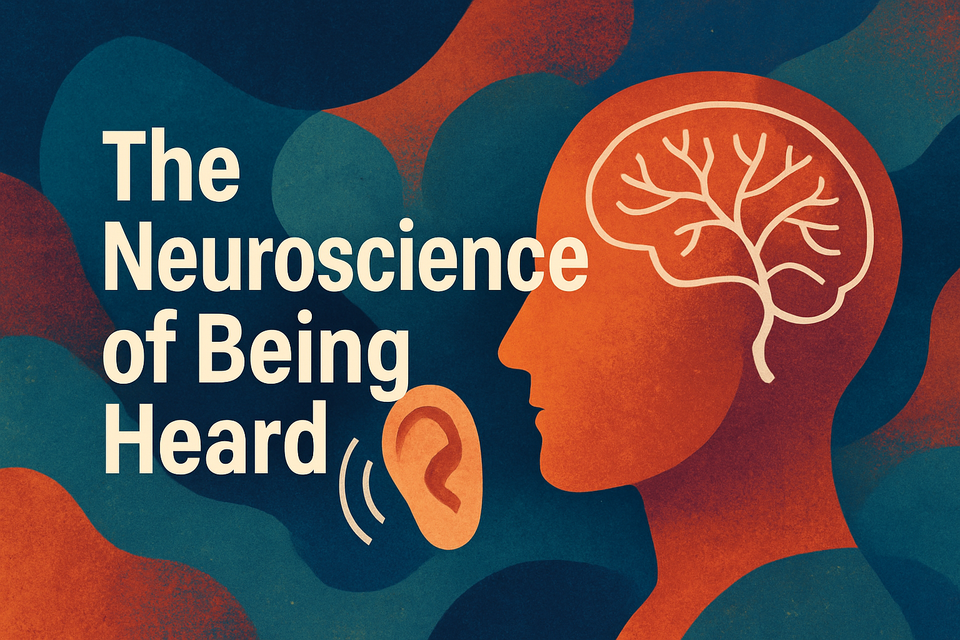The Neuroscience of Being Heard

Being heard does more than comfort. It changes the brain. Here’s what science tells us about how real listening affects our minds and bodies.
Why It Feels So Rare
In a world full of noise and fast replies, real listening is hard to find. You may have shared something that mattered, only to get a quick fix or distracted nod in return. It makes you feel invisible.
The U.S. Surgeon General has warned that chronic loneliness and isolation don’t just hurt. They can shorten your life. They raise the risk of anxiety, depression, and early death. That’s because human connection isn’t just emotional. It’s biological.
How the Brain Responds to Connection
Human brains are built for relationships. As Dr. Louis Cozolino puts it, we are "wired for connection, strengthened by connection, and cannot be understood outside of relationships."
When someone listens with care, your brain responds. Mirror neurons activate. The listener starts to reflect your emotional state. This creates a sense of being seen. Dan Siegel describes this as feeling "seen, soothed, safe, and secure."
This isn’t just a feeling. It’s a measurable event. Your nervous system shifts. According to Dr. Stephen Porges, a calm, present listener helps regulate your stress. Your heart rate slows. Cortisol drops. Breathing evens out.
In one study of married couples, researchers measured stress hormones before and after serious conversations. When one partner felt heard, their stress hormones dropped. When they felt ignored, stress levels rose.
Listening also boosts oxytocin, the hormone tied to bonding and trust. Just being heard in a warm, focused way can shift your entire system toward calm and connection.
Most People Don’t Listen This Way
Deep listening isn’t automatic. Most people plan their replies while you’re still talking. The Korn Ferry Institute calls this the brain’s bias for efficiency and prediction. In short: your brain wants to move on. Listening slows it down.
Trained listeners learn how to override this. They stay with you. They don’t solve or steer. They make space. That act of quiet attention is what your brain needs to feel safe.
Dr. Allan Schore studies how emotions move between people. He has found that when someone listens with real presence, both brains light up in ways that support empathy and emotional regulation. It’s not a metaphor. It’s visible in brain scans.
Listening Rewires the Brain
Your brain can change. That’s what neuroplasticity means. Each time you’re listened to in a safe, attuned way, your brain learns something. It’s okay to show up. You’re worth hearing.
Over time, that becomes a new default setting.
This isn’t just theory. Dr. Arielle Schwartz writes that healthy relationships shape our neural pathways. Listening creates changes in areas tied to mood, stress, and identity. These shifts don’t require a diagnosis. They require presence.
Credentials Matter Less Than Connection
We often assume that change comes from training or credentials. But outcome studies tell a different story. The American Psychological Association reports that connection, empathy, warmth, and trust are often more important than technique.
Psychologist Joseph Durlak reviewed 42 studies comparing licensed professionals like psychologists, psychiatrists, and social workers with minimally trained helpers. He found paraprofessionals matched professionals overall, and in 12 of the 42 evaluations, they actually performed better. He concluded:
"Professionals do not possess demonstrably superior therapeutic skills compared with paraprofessionals. Moreover, professional mental health education training and experience are not necessary prerequisites for an effective helping person." (source)
Later analyses showed that people helped by paraprofessionals did better than 63% of those helped by professionals. (source)
That’s why Listener exists. You don’t need a label to get support. You need someone who shows up and stays with you. You don’t need a label to get support. You need someone who shows up and stays with you.
What Happens When You’re Heard
When someone listens to you with full attention, real changes happen:
- Your nervous system settles. Stress chemicals drop. Breathing steadies.
- Emotions feel manageable. You don’t feel so alone in them.
- You feel valued. Being heard tells your brain you matter.
- Loneliness fades. Real listening creates real connection.
- Your brain shifts toward safety and balance. New patterns form.
This Is Not a Luxury
Being listened to is not extra. It’s core to how we’re built. Your body and brain expect it. Without it, we suffer.
This is not therapy. It’s presence. And presence, backed by science, is often enough.
If you’re overwhelmed, unseen, or just need to talk, being heard might be the start of real change.
If something here resonated…
I’d be honored to have your support. Becoming a Listener Fellow is a small way to say “this matters.” You’ll help shape what Listener becomes—and get a few meaningful perks along the way. 💙
Want the Full Science Behind This?
I’ve pulled together insights from over a dozen peer-reviewed studies—alongside 30+ sourced quotes from experts in neuroscience, psychology, and trauma recovery. This in-depth research summary features voices like Allan Schore, Dr. Arielle Schwartz, and the Makin Institute, all pointing to one truth: being heard can literally change the brain.